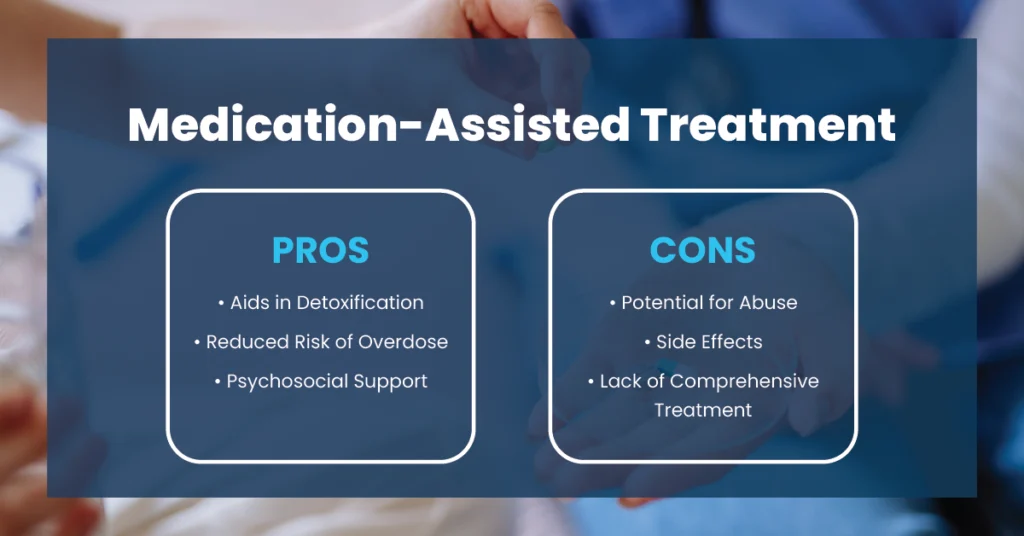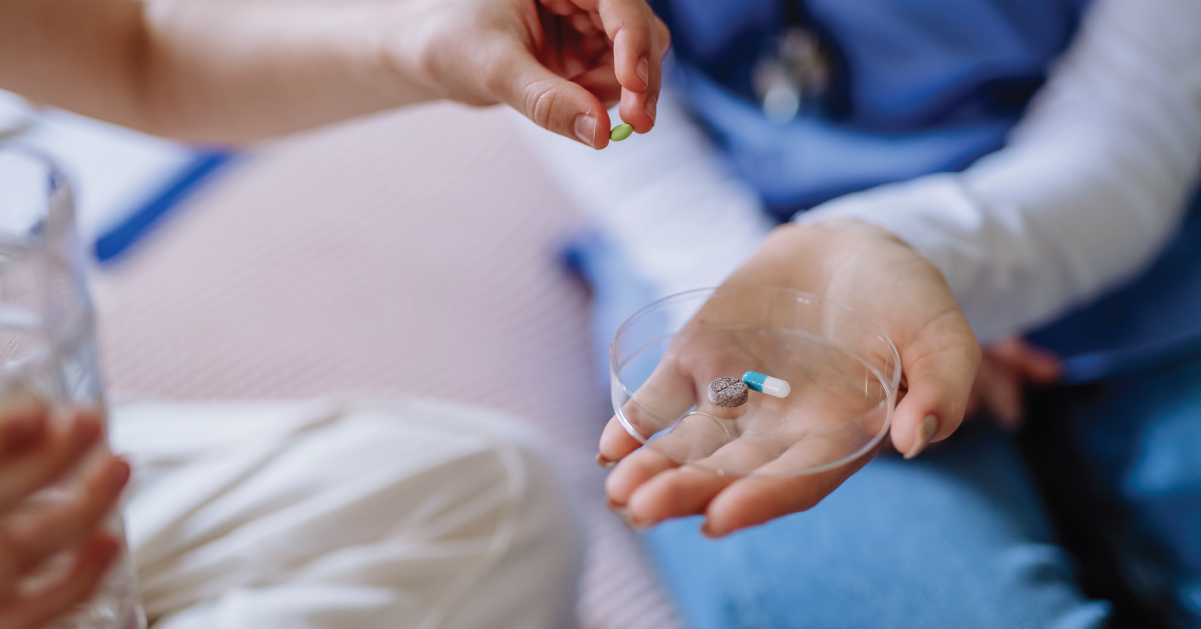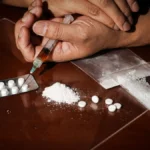Medication-assisted treatment (MAT) has emerged as a crucial approach to addressing substance use disorders. It combines pharmacological interventions with counseling and behavioral therapies, resulting in better outcomes for people struggling with addiction.
Proponents of MAT argue that it can enhance recovery by reducing cravings and withdrawal symptoms. However, critics express concerns about the potential for dependence on prescribed medications and the risk of diversion.
To navigate the pros and cons of MAT, one needs to explore its impact on individual well-being, societal implications, and the overall efficacy of managing addiction in a nuanced manner.
Key Takeaways
MAT is not a one-size-fits-all approach. Treatment plans are tailored to the individual’s specific needs and circumstances. Here’s what you need to know:
- MAT combines medication with behavioral therapies, offering a comprehensive approach to help individuals overcome addiction.
- MAT assists in reducing withdrawal symptoms and cravings, enhancing the effectiveness of addiction treatment, and promoting long-term recovery.
- Striking a balance between the benefits and challenges of MAT is crucial for optimizing its impact on individuals struggling with substance use disorders.
Contact The Haven Detox-Little Rock (501) 271-3342 for assistance in embracing long-term addiction recovery and growth.
Understanding MAT
Medication-assisted treatment (MAT) is a comprehensive approach to treating substance use disorders (SUDs) that combines the use of medications with counseling and behavioral therapies. MAT is primarily employed for individuals grappling with opioid or alcohol addiction, helping to mitigate withdrawal symptoms and cravings while promoting long-term recovery.
MAT is utilized to address the complexities of addiction by targeting the brain’s receptors affected by drugs or alcohol. Its primary goals include:
- Reducing the risk of relapse.
- Improving patient survival.
- Increasing the chances of successful recovery.
MAT is not a standalone treatment but is integrated into a broader strategy that includes counseling and support services. It is particularly effective in enhancing treatment retention and reducing the illicit use of opioids or alcohol.
Types of MAT Medication

There are several medications approved for MAT, each tailored to specific substance dependencies. For opioid use disorder, medications like methadone, buprenorphine, and naltrexone are commonly prescribed.
Methadone and buprenorphine act on the same receptors as opioids but with milder effects, alleviating withdrawal symptoms. Naltrexone, on the other hand, blocks opioid receptors, reducing cravings.
In alcohol use disorder treatment, medications such as acamprosate, disulfiram, and naltrexone are employed. Acamprosate helps maintain abstinence by stabilizing chemical imbalances in the brain, while disulfiram induces unpleasant effects when alcohol is consumed, discouraging its use.
Naltrexone, in this context, diminishes the rewarding effects of alcohol.
Pros of MAT
MAT stands as a cornerstone in the comprehensive approach to managing substance use disorders, presenting several notable advantages in the realm of addiction treatment.
Let’s have a look at each:
Aid in Detoxification
MAT plays a vital role in easing the challenging process of detoxification, especially for those dealing with opioid dependence. Medications like methadone and buprenorphine effectively manage withdrawal symptoms, making the detox phase more manageable.
By minimizing discomfort, MAT increases the likelihood of successful detox completion.
Reduced Risk of Overdose
MAT, often incorporating medications like naloxone, serves as a safeguard against the risk of overdose. Naloxone, an opioid receptor antagonist, can swiftly reverse the effects of opioid overdose, potentially saving lives in emergencies.
This integration of overdose prevention measures enhances the safety of individuals undergoing MAT, a crucial intervention amid the opioid epidemic.
Psychosocial Support
MAT programs often include psychosocial support components, such as counseling and therapy. This holistic approach addresses the multifaceted nature of addiction, not only focusing on the physical aspects through medication but also delving into the psychological and social factors contributing to substance use disorders.
The combination of medication and counseling enhances the overall effectiveness of MAT.
Cons of MAT
While MAT has proven effective in many cases, some criticisms and concerns are still associated with it.
Some potential cons and criticisms include:
Potential for Abuse
A significant concern associated with MAT is the potential for the abuse or diversion of prescribed medications. Medications like methadone and buprenorphine, commonly used in MAT, have abuse potential.
Striking a balance between providing access to necessary medications for those in recovery and preventing misuse is a complex challenge for healthcare providers.
Side Effects
Like any medical intervention, medications used in MAT can have side effects. Individuals undergoing treatment may experience adverse effects, including nausea, constipation, insomnia, and other physical discomforts.
Managing these side effects requires close monitoring and adjustments to medication regimens, potentially complicating the treatment process.
Lack of Comprehensive Treatment
While valuable, MAT is most effective when integrated into a comprehensive treatment plan. Relying solely on medication without addressing the underlying psychological and behavioral aspects of addiction may limit the overall effectiveness of the treatment.
Recognition of these cons is essential for a comprehensive understanding of MAT’s implications in addiction treatment.
The Importance of Medical Professionals in MAT
In the realm of substance abuse treatment, medical professionals play a pivotal role in overseeing the administration of MAT. Their expertise ensures the effectiveness and safety of prescribed medications, emphasizing a personalized approach to address individual needs.
Precision in Dosage
A key responsibility of medical professionals is determining the proper dosage for individuals undergoing MAT. This precision is critical in managing withdrawal symptoms, effects of opioids, and cravings effectively while minimizing the risk of adverse effects.
By tailoring dosages to each patient, medical professionals contribute significantly to the therapeutic benefits of the treatment.
Therapy
Beyond medication, therapy is an integral part of the treatment plan for substance use disorders. Medical professionals or doctors collaborate with therapists to address the psychological aspects of addiction.
This dual approach recognizes the interconnectedness of physical and psychological dimensions in the recovery process.
Benefits of MAT for Substance Abuse
MAT combines medication with counseling and behavioral therapies to treat substance use disorders, especially opioid use disorders.
Here are some benefits of MAT for substance abuse:
- Reduced Cravings and Withdrawal Symptoms: Medications used in MAT can help reduce cravings and alleviate withdrawal symptoms, making it easier for individuals to abstain from drug use.
- Improved Physical and Mental Health: MAT can improve overall health by stabilizing individuals physically and mentally. It allows individuals to focus on their recovery and engage more effectively in counseling and other therapeutic interventions.
- Prevention of Overdose: In the case of opioid use disorders, medications like methadone and buprenorphine can help reduce the risk of overdose by providing a safer alternative to illicit opioids.
- Reduced Criminal Activity: MAT has been shown to decrease criminal activity associated with substance abuse. By addressing the underlying addiction, individuals are less likely to engage in illegal activities to support their drug use.
- Improved Social Functioning: MAT can enhance an individual’s ability to function socially, maintain employment, and fulfill familial responsibilities, contributing to a more stable and productive life.Increased HIV and Hepatitis C Prevention: For individuals who inject drugs, MAT can contribute to a reduction in risky behaviors such as sharing needles, thereby lowering the risk of HIV and hepatitis C transmission.
Frequently Asked Questions (FAQ)
Medication-assisted therapy (MAT) combines medications and cognitive-behavioral therapy under medical supervision to treat drug addiction, particularly opioid addiction. The goal is to reduce cravings and withdrawal effects, enhance the effectiveness of treatment programs, and support individuals in overcoming opioid addictions.
Medication-assisted treatment (MAT) has shown success rates ranging from 40-60 percent, significantly improving outcomes for clients with substance use disorders. Combining medications with counseling and therapy enhances recovery by addressing both physiological and behavioral aspects of drug abuse.
The success rate varies based on factors such as the substance involved and individual adherence.
Unleash Resilience With The Haven Detox-Little Rock
Break free from the chains of addiction with The Haven Detox-Little Rock.Our compassionate team is dedicated to guiding you toward lasting recovery, offering specialized addiction treatment services for substances like alcohol, heroin, or opioids.
Our medical detox ensures a safe and comfortable transition, while our residential treatment program empowers you with the tools to overcome addiction.Contact us at (501) 271-3342 today to start your transformative path to a brighter, addiction-free future.




